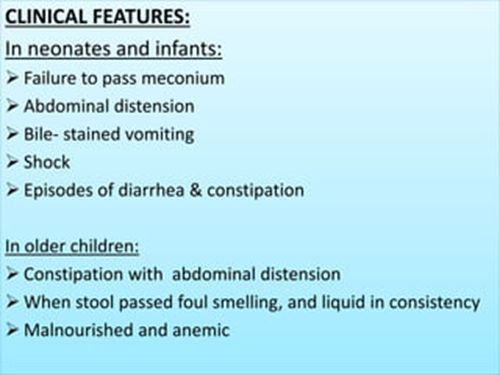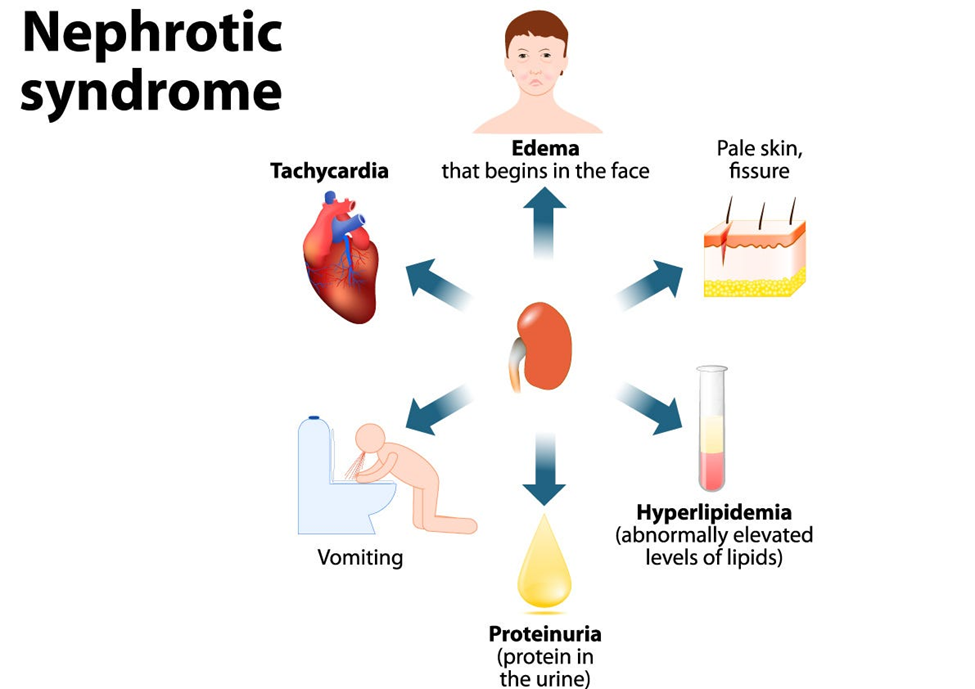A nurse is caring for a child who has Hirschsprung disease. Which of the following findings should the nurse expect?
Ridged abdomen
Ribbonlike, foul-smelling stools
Projectile vomiting
Chronic hunger
The Correct Answer is B
A. Ridged abdomen - This finding is not typically associated with Hirschsprung disease. Instead, the abdomen may appear distended or bloated due to the accumulation of stool in the colon.
B. Ribbonlike, foul-smelling stools - This is a characteristic finding in Hirschsprung disease. Because the affected portion of the colon lacks nerve cells (ganglion cells) responsible for peristalsis, stool movement is impaired, leading to the passage of narrow, ribbonlike stools. These stools may also have a foul odor due to bacterial overgrowth in the affected area.
C. Projectile vomiting - Projectile vomiting is not a common finding in Hirschsprung disease. It is more commonly associated with conditions such as pyloric stenosis or gastroesophageal reflux.
D. Chronic hunger - Chronic hunger is not a typical finding in Hirschsprung disease. Instead, affected infants may experience feeding difficulties, constipation, and failure to thrive due to the obstruction of stool in the colon. They may also exhibit symptoms such as abdominal distention, vomiting, and refusal to feed.

Nursing Test Bank
Naxlex Comprehensive Predictor Exams
Related Questions
Correct Answer is C
Explanation
A. Orange-tinged urine
- This manifestation is not typically associated with nephrotic syndrome. Orange-tinged urine may indicate other conditions such as dehydration, liver disease, or the presence of certain medications or foods.
B. Hypertension
- Hypertension is not a common manifestation of nephrotic syndrome. However, it can occur in some cases due to the retention of sodium and water, which can lead to fluid overload and increased blood pressure.
C. Periorbital edema
- This is a classic manifestation of nephrotic syndrome. Periorbital edema, or swelling around the eyes, is often one of the initial signs observed in children with nephrotic syndrome due to the loss of protein in the urine, leading to fluid accumulation in the tissues.
D. Polyuria
- Polyuria, or increased urine output, is not typically associated with nephrotic syndrome. Instead, children with nephrotic syndrome may experience oliguria or normal urine output, depending on the severity of renal involvement and fluid balance.

Correct Answer is C
Explanation
A. Gelatin: Gelatin is sometimes used as a stabilizer in vaccines, including some flu vaccines. Individuals with severe gelatin allergies may need to avoid vaccines containing gelatin. However, egg allergy is more common and directly relevant to the contraindication for flu vaccination.
B. Peanuts: Peanuts are not typically used in the production of flu vaccines. Peanut allergies are not a contraindication for flu vaccination unless the person also has an egg allergy or another contraindication.
C. Eggs: Flu vaccines are commonly produced using chicken eggs. Therefore, individuals with a severe egg allergy should avoid flu vaccines, as they may experience an allergic reaction. This is especially important for young children, as they may be more prone to severe allergic reactions.
D. Bee Venom: Bee venom is not an ingredient in flu vaccines. While it's essential to consider allergies to various substances when administering vaccines, bee venom allergy does not impact the safety of flu vaccination.
Whether you are a student looking to ace your exams or a practicing nurse seeking to enhance your expertise , our nursing education contents will empower you with the confidence and competence to make a difference in the lives of patients and become a respected leader in the healthcare field.
Visit Naxlex, invest in your future and unlock endless possibilities with our unparalleled nursing education contents today
Report Wrong Answer on the Current Question
Do you disagree with the answer? If yes, what is your expected answer? Explain.
Kindly be descriptive with the issue you are facing.
